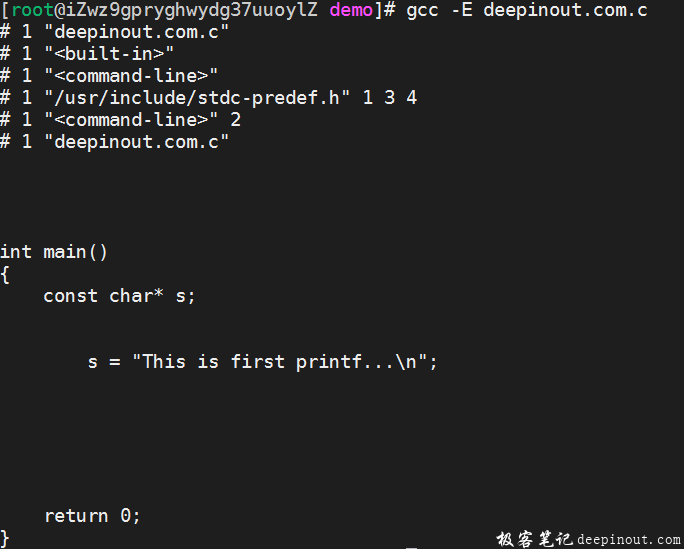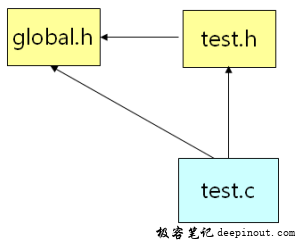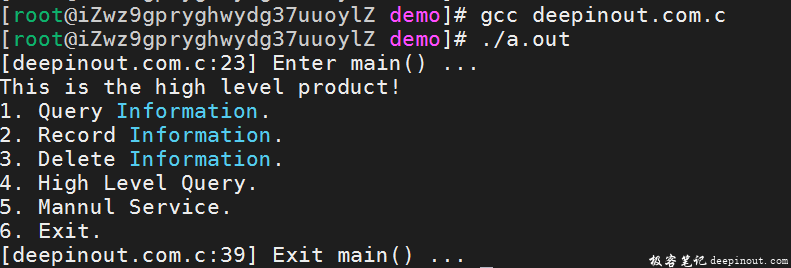条件编译的行为类似于C语言中的if...else...,条件编译是预编译指示命令,用于控制是否编译某段代码。
条件编译初探
通过下面这个例子,我们初探条件编译时如何工作的。
// #include <stdio.h>
#define C 1
int main()
{
const char* s;
#if( C == 1 )
s = "This is first printf...\n";
#else
s = "This is second printf...\n";
#endif
// printf("%s", s);
return 0;
}
预编译gcc -E deepinout.com.c -o deepinout.com.i结果:

拿掉注释,编译运行结果:

条件编译的本质
条件编译的本质:
- 预编译器根据条件编译指令有选择地删除代码
- 编译器不知道代码分支的存在
if...else...语句在运行期进行分支判断,条件编译指令在预编译期进行分支判断- 可以通过命令行定义宏
gcc -Dmacro=value file.c或gcc -Dmacro file.c
示例:通过命令行定义宏
#include <stdio.h>
int main()
{
const char* s;
#ifdef C
s = "This is first printf...\n";
#else
s = "This is second printf...\n";
#endif
printf("%s", s);
return 0;
}
执行如下编译命令:
gcc -DC deepinout.com.c
运行结果:

条件编译解决重复包含头文件问题
条件编译的本质:
- #include 的本质是将已经存在的文件内容嵌入到当前文件中
#include的间接包含同样会产生嵌入文件内容操作
间接包含同一头文件是否会产生编译错误?

条件编译的使用示例
// global.h
#ifndef _GLOBAL_H_
#define _GLOBAL_H_
int global = 10;
#endif
// test.h
#ifndef _TEST_H_
#define _TEST_H_
#include "global.h"
const char* NAME = "test.h";
char* hello_world(){
return "Hello deepinout.com!\n";
}
#endif
deepinout.com.c
#include <stdio.h>
#include "test.h"
#include "global.h"
int main()
{
const char* s = hello_world();
int g = global;
printf("%s\n", NAME);
printf("%d\n", g);
return 0;
}
运行结果:

条件编译可以解决头文件重复包含的编译错误:
#ifndef _HEADER_FILE_H_
#define _HEADER_FILE_H_
//source code
#endif
条件编译的意义
- 条件编译使得我们可以按不同的条件编译不同的代码段,因而可以产生不同的目标代码
#if...#else...#endif被预编译器处理,而if...else...语句被编译器处理,必然被编译进目标代码- 实际工程中条件编译主要用于以下两种情况
- 不同的产品线共用一份代码
- 区分编译产品的调试版和发布版
示例:产品线区分及调试代码应用
product.h
#define DEBUG 1
#define HIGH 1
deepinout.com.c
#include <stdio.h>
#include "product.h"
#if DEBUG
#define LOG(s) printf("[%s:%d] %s\n", __FILE__, __LINE__, s)
#else
#define LOG(s) NULL
#endif
#if HIGH
void f()
{
printf("This is the high level product!\n");
}
#else
void f()
{
}
#endif
int main()
{
LOG("Enter main() ...");
f();
printf("1. Query Information.\n");
printf("2. Record Information.\n");
printf("3. Delete Information.\n");
#if HIGH
printf("4. High Level Query.\n");
printf("5. Mannul Service.\n");
printf("6. Exit.\n");
#else
printf("4. Exit.\n");
#endif
LOG("Exit main() ...");
return 0;
}
运行结果:

总结
- 通过编译器命令行能够定义预处理器使用的宏
- 条件编译可以避免重复包含同一头文件
- 条件编译是在工程开发中可以区分不同产品线的代码
- 条件编译可以定义产品的发布版和调试版
 极客笔记
极客笔记